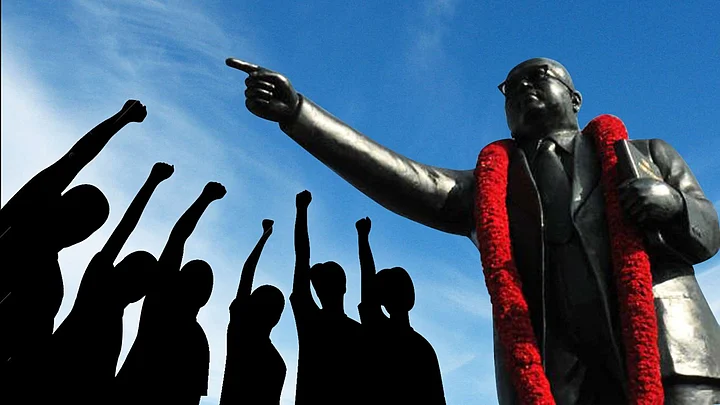Data shows that caste-based inequalities persist in education and government jobs in India. In urban spaces, the bias against Dalits manifests in the form of micro-aggression, verbal and non-verbal insults; thus, creating a hostile environment.
65.8 percent of India’s Dalits are classified as poor. Power corridors at both the Centre and State remain largely inaccessible to Dalits. Only 5 percent of all posts above the joint secretary level are taken by Dalits.
Only 0.73 percent of Scheduled Caste (SC) households had a salaried government job (both Center and State), according to the Socio-Economic Caste Census 2011.
As for the self-employed SCs and Scheduled Tribes (STs), their businesses fared “significantly worse” than those owned by the privileged castes, with 55 percent of the earnings gap unexplained, implying “greater discrimination”.
Even Dalit doctors face discrimination, both in medical college and in practice, where patients are known to stop availing of their services upon becoming aware of the doctor’s caste.
In urban salaried jobs, employees belonging to the SCs/STs received 30 percent lower wages on an average, compared to those from other caste groups. Moreover, candidates with upper-caste surnames have a higher probability of securing job interviews.
Nearly 80 percent of students who died by suicide in IITs till 2011 were Dalit.
Let’s get to the heart of the matter. The nearly 3,000-year old Indian caste system is hierarchical, demarcating work and duty for a Hindu individual, based not on ability / inclination, but by the ‘Russian roulette’ of birth.
The Catch-22 of Caste-Based Reservation
This self-serving caste system was instrumental in indoctrinating Brahminical privilege through ‘Manuvad’ – a guiding ethos which formed the basis of organised oppression and discrimination. It also gave rise to the twin ideas of karma (job) and dharma (Duty). The Dalits, literally meaning broken or scattered, were the outcasts of this Varna system.
An upwardly-mobile Dalit who uses caste-based reservation faces ‘double stigmatisation’; first, due to his/her underprivileged caste, and second, on account of being ‘undeserving’ and ‘incompetent’.
Dr BR Ambedkar pierced the foundational core of the caste system. In his undelivered speech, ‘Annihilation of Caste’, he draws a distinction between caste and race – caste was non-transcendental and could not be de-stigmatised with an elite pedagogy or even a higher-income bracket.
Further, the benefits stemming from entitlement and superiority at each caste level perpetuated the hierarchical system, making equality a near impossibility.
The statistics clearly mention that there is a significant ‘unexplained’ factor that might explain this caste-based exclusion. Success is attributed to external factors such as state support (‘externalisation’), and all realities of overcoming great odds, gene-altering centuries of exploitation, lack of exposure and absence of sponsors, networks and mentors, become moot points.
While externalisation of success is ubiquitous, a pejorative belief against Dalits who use reservation, is of them being ‘undeserving’ and ‘unworthy’ of their institutions or jobs.
Dalits therefore, feel the need to actively dissociate from this identity, reducing chances of mentoring and sponsoring other Dalits. This perpetuation of stigma necessitates affirmative action.
The Fallacy of ‘Meritocracy’
“Meritocracy is the most self-congratulatory of distribution principles. Its ideological alchemy transmutes property into praise, material inequality into personal superiority. It licenses the rich and powerful to view themselves as productive geniuses. While this effect is most spectacular among the elite, nearly any accomplishment can be viewed through meritocratic eyes,” says Toronto-based writer and academic, Clifton Mark.
An upper-caste privileged life of wealth, power or both, results in creating circumstances that are conducive to success, further expounded by leveraging existing strong and expansive networks. Lower representation of Dalits at the top does not create this network effect of sponsorship.
In the wake of discrimination and questions on credibility, most Dalits move away from their roots. Acceptance by a higher social order leads Dalits to hide their identity and take up what is known as ‘Sanskritisation’ or emulation of practices of upper-caste Hindus.
This rejection of their core identity results in localising the benefits of the quota system–which was introduced by the Government of India Act, 1935, to ensure political representation of Dalits, facilitate access to government jobs and education, and which envisioned significant results in the first 10 years of its implementation.
Stories that Need to be Told
Debunking myths around productivity, recognising effort and celebrating competence of Dalits is crucial for removing the stigma. “To begin with, publicising achievements of AA (Affirmative Action) beneficiaries and highlighting success stories instead of focusing on dropouts could, over time, weaken the stigma of incompetence.” (Deshpande 2016)
Thus, to reduce stigma, let us create and promote an environment of sponsorship and mentorship. More and more successful Dalits should actively reach out and tell their winning stories. Share your tales; we want to look up to you!
(Parikrama Chowdhry works towards developing rural entrepreneurship. She writes to share her observations with a wider audience. She currently heads two verticals – Monitoring and Evaluation & Communications – at an organisation that works towards developing enabling conditions for smallholders’ prosperity. This is an opinion piece and the views expressed above are the author’s own.The Quint neither endorses nor is responsible for the same.)
